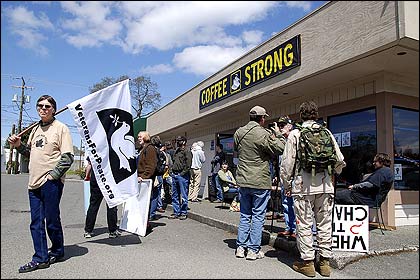
A Cup of (G.I.) Joe
UO prof’s film reveals Grounds for Resistance
by Rick Levin
GROUNDS FOR RESISTANCE: A documentary directed by Lisa Gilman. Co-sponsored by UO Center for the Study of Women in Society, UO Center for Intercultural Dialogue and Cinema Studies. 2011. Not rated. 50 minutes.
 |
Lisa Gilman is about as unlikely a filmmaker as you’re going to find, though her cinematic trajectory is hardly an accident ” more like fate, or a labor of love. An associate professor of folklore at UO, Gilman was researching a project on the musical listening practices of troops when she interviewed Benji Lewis, a Marine vet and anti-war activist. Lewis told her about Coffee Strong, a café located just outside Fort Lewis Army Base near Tacoma, Wash. Modeled on the G.I. coffee house movement during the Vietnam War, Coffee Strong provides a kind of community hub for military people of all stripes, providing them with entertainment as well as services ranging from legal aid and trauma therapy to vocational training and G.I. rights counseling.
Gilman, who after talking to Lewis drove up to Coffee Strong to see for herself, says she was “especially drawn to these young people whose activism was inspired from their own very real experiences with war.” Also inspiring for Gilman was the fact that the café offers vets outreach and resources for healing, regardless of their political leanings. Such a unique combination of community caring and political action proved irresistible to both the activist and folklorist in Gilman; hence her debut documentary, Grounds for Resistance, a powerful, emotionally stirring portrait of Coffee Strong that screens Thursday, June 9, at the Bijou.
Grounds for Resistance is a stripped-down piece of guerrilla filmmaking, shot on a shoestring budget (about $10,000) and completely lacking in the cant and artifice of documentarian sophisticates such as Errol Morris or Ross McElwee. And if Gilman’s documentary isn’t striving to notch any cinematic style points, all the better; the ethnographer in her simply stands aside, allowing the story of Coffee Strong and its founders and patrons to tell itself in a way that is natural yet insistent, informed by an ingrained humanism that casts no judgment but simply opens its ears to listen and its eyes to see.
“I decided to make a film rather than write about Coffee Strong because I felt it was a story that most of us don’t know and wouldn’t ever hear about,” Gilman tells me. “Given our country’s involvement in two wars, it’s crucial that we have information about what our troops are experiencing during and after their deployments.”
Indeed, Grounds for Resistance should peel the scales from the public eye, as it were. For instance, I gasped when the film reveals that an estimated one in three women in the military is raped. Such statistics are humanized by the intimate, vulnerable testimonies Gilman captures on film ” testimonies marked by courage, outrage and, sometimes, a newfound confidence anchored in the realization that estranged vets are not alone in the universe. Quite the contrary.
The images Gilman captures of Iraq and Afghanistan vets sitting around Coffee Strong, openly sharing their wartime experiences with each other, completely belies the entrenched cultural ideal of the taciturn vet, a myth fostered by millennia of gender expectations, cultural denial and plain old fear. “I’m becoming somebody that I don’t want to be,” one vet recalls thinking when he denied help to a desperate civilian. “It’s a very easy decision not to kill someone,” another soldier declares, sending an ideological chill through the primordial violence fostered in the military. Perhaps most haunting is the scene of a mother and father sharing the tragic story of their son’s suicide note: “Dad, please don’t look, just call the police.”
If such words aren’t revolutionary, nothing is.
Gilman says she’s been surprised by the feedback the film has received already, after just a handful of screenings. “I have been overwhelmed by how positive the responses have been so far,” she told me. “These responses have been from people in the film, veterans and people with little knowledge that this movement is happening.”
Grounds for Resistance screens Thursday, June 9, at the Bijou; for further information, visit www.bijou-cinemas.com